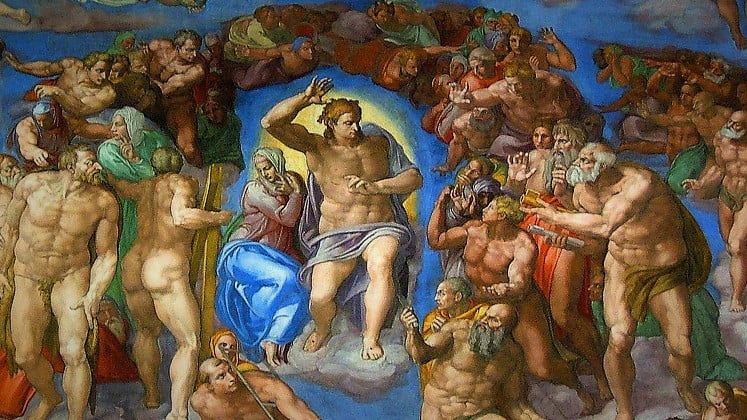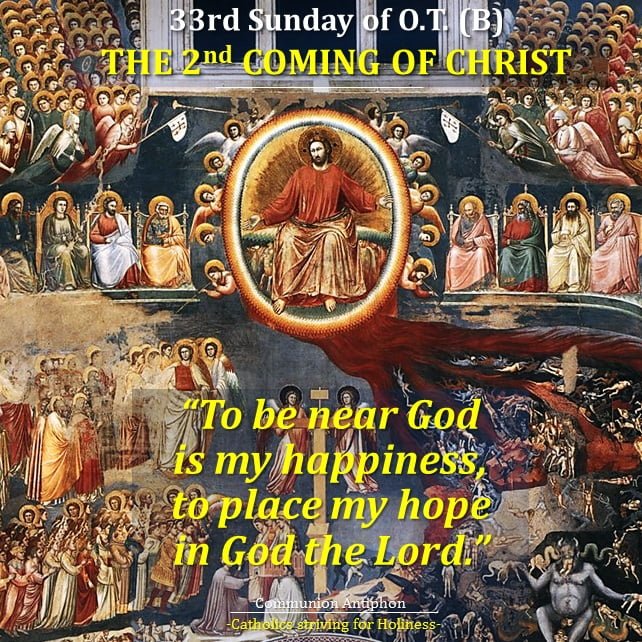Monday, 1st week of Lent GOSPEL COMMENTARY:
THE LAST JUDGMENT

Mt 25:31-46
WHAT IS THE FINAL OR LAST JUDGMENT?
1.The FINAL JUDGMENT is different from the PARTICULAR JUDGMENT.
- The PARTICULAR JUDGMENT occurs IMMEDIATELY AFTER THE DEATH of the person.
- “It is the judgment of immediate retribution which each one after death will receive from God in his immortal soul IN ACCORD WITH HIS FAITH AND HIS WORKS. This retribution consists in entrance into the happiness of HEAVEN, immediately or after an appropriate purification, or entry into the eternal damnation of HELL (Compendium of the Catechism of the Catholic Church, n. 208).”
2. The FINAL JUDGMENT will be preceded by the “the RESURRECTION OF ALL THE DEAD”
- There will be a RESURRECTION OF THE BODIES “‘OF BOTH THE JUST AND THE UNJUST,’… This will be ‘the hour when all who are in the tombs will hear [the Son of man’s] voice and come forth, those who have done good, to the resurrection of life, and those who have done evil, to the resurrection of judgment’ (Catechism of the Catholic Church, n. 1038).” “Our mortal bodies will one day come to life again (Compendium of the Catechism of the Catholic Church, n. 203).”
- “Many of those who sleep in the dust of the earth shall awake; some shall live forever, others shall be an everlasting horror and disgrace (Dn 12:2).”
3. IN WHAT DOES THE FINAL JUDGMENT CONSIST?
- Our Lord Jesus Christ will ratify the retribution received by each soul during the particular judgment but this time the resurrected body will share in it as well.
- “Christ will come ‘in his glory, and all the angels with him …. Before him will be gathered all the nations, and he will separate them one from another as a shepherd separates the sheep from the goats, and he will place the sheep at his right hand, but the goats at the left…. And they will go away into ETERNAL PUNISHMENT, but the righteous into ETERNAL LIFE (see Mt 25: 31-46)’ (Catechism of the Catholic Church, n. 1038).”
- “The final or universal judgment consists in a SENTENCE OF HAPPINESS OR ETERNAL CONDEMNATION, which the Lord Jesus will issue in regard to the “just and the unjust” (Acts 24:15) when he returns as the JUDGE OF THE LIVING AND THE DEAD. After the last judgment, THE RESURRECTED BODY WILL SHARE IN THE RETRIBUTION WHICH THE SOUL RECEIVED AT THE PARTICULAR JUDGMENT (Compendium of the Catechism of the Catholic Church, n. 214).”
4. WHEN?
- “ONLY THE FATHER KNOWS THE DAY AND THE HOUR; ONLY HE DETERMINES THE MOMENT OF ITS COMING. Then through his Son Jesus Christ he will pronounce the final word on all history.
- WE SHALL KNOW THE ULTIMATE MEANING OF THE WHOLE WORK OF CREATION AND OF THE ENTIRE ECONOMY OF SALVATION and UNDERSTAND THE MARVELOUS WAYS BY WHICH HIS PROVIDENCE LED EVERYTHING TOWARDS ITS FINAL END.
- The Last Judgment will reveal that GOD’S JUSTICE TRIUMPHS OVER ALL THE INJUSTICES COMMITTED BY HIS CREATURES AND THAT GOD’S LOVE IS STRONGER THAN DEATH (Catechism of the Catholic Church, n. 1040).”
5. Then, THE SALVIFIC PLAN OF GOD WILL HAVE ITS DEFINITIVE REALIZATION: ‘NEW HEAVENS’ AND ‘NEW EARTH’
- “After the final judgment THE UNIVERSE ITSELF, FREED FROM ITS BONDAGE TO DECAY, WILL SHARE IN THE GLORY OF CHRIST WITH THE BEGINNING OF ‘THE NEW HEAVENS’ AND A ‘NEW EARTH’ (2 Peter 3:13). Thus, the fullness of the Kingdom of God will come about, that is to say, THE DEFINITIVE REALIZATION OF THE SALVIFIC PLAN OF GOD TO ‘UNITE ALL THINGS IN CHRIST, THINGS IN HEAVEN AND THINGS ON EARTH’ (Ephesians 1:10). GOD WILL THEN BE ‘ALL IN ALL’ (1 Corinthians 15:28) in eternal life (Compendium of the Catechism of the Catholic Church, n. 216).”
- “In this new universe, the heavenly Jerusalem, GOD WILL HAVE HIS DWELLING AMONG MEN. ‘HE WILL WIPE AWAY EVERY TEAR FROM THEIR EYES, AND DEATH SHALL BE NO MORE, NEITHER SHALL THERE BE MOURNING NOR CRYING NOR PAIN ANY MORE, FOR THE FORMER THINGS HAVE PASSED AWAY (Rev 21:4)’ (Catechism of the Catholic Church, n. 1044) “
Dear friends, the message of the Final Judgment points to the GLORIOUS AND VICTORIOUS COMING OF OUR LORD JESUS CHRIST. THIS IS OUR FINAL GOAL: “AN ENCOUNTER WITH THE RISEN LORD.” Pope Francis said in his Nov. 15, 2015 Angelus Address:
“I would like to ask how many of you think about this: ‘There will be a day in which I encounter the Lord face to face.’ And this is our goal, our encounter. We do not await a time or a place; rather we are going to encounter a person: Jesus. THUS THE PROBLEM IS NOT ‘WHEN’ THESE PREMONITORY SIGNS OF THE LAST DAYS WILL OCCUR, BUT RATHER THAT WE FIND OURSELVES PREPARED. It’s also not about knowing ‘how’ these things will happen, but instead ‘how’ we have to act today, in awaiting these things.”
This definitive event spurs us to be VIGILANT and instills in us a HOLY FEAR OF GOD –LOVE! – AND COMMITS US TO LIVE A HOLY LIFE, convinced that God’s love, power, justice and mercy will prevail once and for all over the evils and injustices of this world. And one day, while we await with the “blessed hope” of our Lord’s return, he will come “to be glorified in his saints, and to be marveled at in all who have believed (Titus 2:13; 2 Thess 1:10).”
Let us then embark on the path of DAILY CONVERSION while God is still giving us “the acceptable time” to prepare ourselves for “the day of salvation (2 Cor 6:2.),” without being afraid of denying ourselves for God and for other, knowing that the
“The triumph of Jesus at the end of time will be the triumph of the cross, the demonstration that the sacrifice of oneself for love of neighbor, in imitation of Christ, is the only victorious power, the only stable point in the midst of the upheavals of the world.
(Pope Francis, Angelus, Nov. 15, 2015)”
- 31-33 In the Prophets and in the Book of Revelation the Messiah is depicted on a throne, like a judge. This is how Jesus will come at the end of the world, to judge the living and the dead.
- The Last Judgment is a truth spelt out in the very earliest credal statements of the Church and a dogma of faith solemnly defined by Benedict XII in the Constitution Benedictus Deus (29 January 1336).
- 35-46 All the various things listed in this passage (giving people food and drink, clothing them, visiting them) become works of Christian charity when the person doing them sees Christ in these “least” of his brethren.
- Here we can see the seriousness of sins of omission. Failure to do something which one should do means leaving Christ unattended.
- “We must learn to recognize Christ when he comes out to meet us in our brothers, the people around us. No human life is ever isolated. It is bound up with other lives. No man or woman is a single verse; we all make up one divine poem which God writes with the cooperation of our freedom” (St. Josemaria, Christ is passing by, 111).
- We will be judged on the degree and quality of our love (cf. St John of the Cross, Spiritual Sentences and Maxims, 57). Our Lord will ask us to account not only for the evil we have done but also for the good we have omitted to do. We can see that sins of omission are a very serious matter and that the basis of love of neighbour is Christ’s presence in the least of our brothers and sisters.
- St Teresa of Avila writes: “Here the Lord asks only two things of us: love for his Majesty and love for our neighbour. It is for these two virtues that we must strive, and if we attain them perfectly we are doing his will. . . . The surest sign that we are keeping these two commandments is, I think, that we should really be loving our neighbour; for we cannot be sure if we are loving God, although we may have good reasons for believing that we are, but we can know quite well if we are loving our neighbour. And be certain that, the farther advanced you find you are in this, the greater the love you will have for God; for so dearly does his Majesty love us that he will reward our love for our neighbour by increasing the love which we bear to himself, and that in a thousand ways: this I cannot doubt” (Interior Castle, V, 3).
- This parable clearly shows that Christianity cannot be reduced to a kind of agency for “doing good”. Service of our neighbour acquires supernatural value when it is done out of love for Christ, when we see Christ in the person in need. This is why St Paul asserts that “if I give away all I have . . . but have not love, I gain nothing” (1 Cor 13:3). Any interpretation of Jesus’ teaching on the Last Judgment would be wide of the mark if it gave it a materialistic meaning or confused mere philantrophy with genuine Christian charity.
- 40-45 In describing the exigencies of Christian charity which gives meaning to “social aid”, the Second Vatican Council says:
- “Wishing to come down to topics that are practical and of some urgency, the Council lays stress on respect for the human person: everyone should look upon his neighbour (without any exception) as another self, bearing in mind above all his life and the means necessary for living it in a dignified way ‘lest he follow the example of the rich man who ignored Lazarus, the poor man’ (cf. Lk 16:18-31).
- “Today there is an inescapable duty to make ourselves the neighbour of every man, no matter who he is, and if we meet him, to come to his aid in a positive way, whether he is an aged person abandoned by all, a foreign worker despised without reason, a refugee, an illegitimate child wrongly suffering for a sin he did not commit, or a starving human being who awakens our conscience by calling to mind the words of Christ: ‘As you did it to one of the least of these my brethren, you did it to me’’’ (Gaudium et spes, 27).
- 46 The eternal punishment of the reprobate and the eternal reward of the elect are a dogma of faith solemnly defined by the Magisterium of the Church in the Fourth Lateran Council (1215): “He [Christ] will come at the end of the world; he will judge the living and the dead; and he will reward all, both the lost and the elect, according to their works. And all these will rise with their own bodies which they now have so that they may receive according to their works, whether good or bad; the wicked, a perpetual punishment with the devil; the good, eternal glory with Christ”.
Stay updated: subscribe by email for free TO OUR NEW WEBSITE www.catholicsstrivingforholiness.org (PUT YOUR EMAIL IN THE SUBSCRIBE WIDGET).
We are also in www.fb.com/Catholicsstrivingforholiness. Kindly help more people in their Christian life by liking our page and inviting your family, friends and relatives to do so as well. Thanks in advance and God bless you and your loved ones! Fr. Rolly Arjonillo

